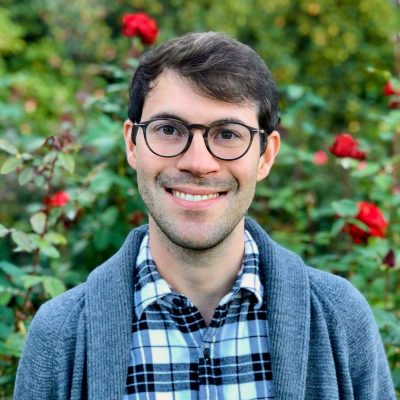Student Spotlight: Amnon Ortoll-Bloch

May 18, 2020
Amnon Ortoll-Bloch is a doctoral candidate in chemistry and chemical biology from Colima City, Colima, Mexico. After earning his bachelor’s degree at National Autonomous University of Mexico (UNAM) in Mexico City, Mexico, he chose to pursue further study at Cornell due to its faculty, research opportunities, and collaborative and supportive nature.
What is your area of research and why is it important?
My research focuses on the crystallization of a family of materials called hybrid perovskites. These materials are promising candidates for solar-cell applications because they are cheaper to make than current technologies. Perovskite solar cells consist of crystalline films that are made from solution. I investigate what happens once you dissolve the starting materials and how the dissolved components come together to form a crystal. By understanding how these materials crystallize, we can control the quality and properties of the resulting crystalline films to ultimately make more efficient solar cells.
What are the larger implications of this research?
This research will help us learn how to make perovskite solar cells with improved device performance. Getting a better understanding of how these materials form can allow us to tailor the fabrication process to get films with specific properties. For example, we can control the size of the crystals and how smooth the films are. By increasing their light-conversion efficiency, perovskite solar panels might be able to replace silicon, the most popular commercial solar-cell material nowadays. Thanks to their lower cost compared to silicon, perovskite solar cells could help solar energy become more widespread in both urban and rural areas.
What inspired you to choose this field of study?
As a chemistry major in undergrad, I took a solid-state chemistry class. I was amazed by how atoms and molecules are arranged at the smallest scale in a material. Thinking about the atomic-scale structure of materials–in particular, crystals–was truly exciting to me. Besides the solid-state, I was also intrigued by thinking about the molecular-scale details of what happens in a solution when you dissolve a solid. What was really appealing to me about studying crystallization from solution as a graduate student was that I would be able to combine my interests in solid-state and solution chemistry.
What have you gained by participating in the NextGen Professors Program?
I have gained a sense of community with the members of the NextGen Professors Program. We all care for each other and want one another to succeed. By engaging in enriching discussions, I have learned from the other members of the cohort as well as from guests that have shared their experiences with us. This program has taught me about different perspectives on how to tackle current challenges in academia as well how to work on ourselves to avoid self-sabotaging behavior.
How has this program been helpful in working toward your professional goals?
Hearing from faculty in different stages of their career has helped me develop a better sense of how I can navigate the world of academia. The NextGen Professors Program has provided me with practical tools to develop a strong faculty application package, such as learning how to write effective teaching and diversity statements. Additionally, I have learned about how we can make academia a more inclusive, supportive environment for a diverse population of students, faculty, and staff.
What are your hobbies or interests outside of your research or scholarship?
I like hiking and the outdoors. I really enjoy being out in nature, especially near bodies of water. I love music and film. I am also interested in languages and learning about other cultures and cuisines. I have developed a love for cooking during graduate school.
Why did you choose Cornell to pursue your degree?
I chose Cornell mainly because of the faculty and the breadth of exciting research being conducted on campus. The graduate students I met during the visit weekend seemed happy, too. Moreover, I got the impression that the atmosphere on campus was positive and supportive. People seemed happy to collaborate with both members within and outside their department. Being in a healthy, collaborative environment was important to me and Cornell had that, and more, to offer.
